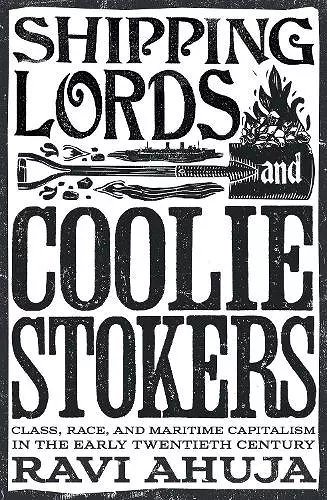Shipping Lords and Coolie Stokers
Class, Race, and Maritime Capitalism in the Early Twentieth Century
Format:Paperback
Publisher:Verso Books
Published:17th Dec '24
Should be back in stock very soon

A TRAGIC SHIPPING ACCIDENT OPENS A WINDOW ON RACIALIZED LABOUR MANAGEMENT IN AN AGE OF IMPERIALISM
When eighty-seven passengers and crew died in the shipwreck of the Royal Mail ship Egypt in 1922, the accident gave rise to a racist international press campaign against the employment of Indian seafarers, such as those who made up most of the ship's crew. This was not unusual at a time when a fifth of the British mercantile marine's workforce was recruited from the subcontinent. Ravi Ahuja explains the business logic behind a labour regime steeped in racist irrationalism and examines the scope for solidarity among a divided workforce in an age of imperialism - an issue that is no less relevant in our own time.
This gem of a book the delivers micro-history at its best. It is a genuine page-turner, a riveting read, which challenges widely-held notions of 'agency'. -- Joya Chatterji, author of Shadows at Noon: The South Asian Twentieth Century
Taking off from the catastrophic loss of life in the shipwreck of a Royal Mail vessel in 1922, Ravi Ahuja weaves an insightful account of race and class in the context of British imperialism and corporate control of shipping. At the center of his account are Indians stoking coal in the ship's engine room. This book is both a thought-provoking analysis of a socially divided labor regime and a fascinating story well told. -- Frederick Cooper, co-author of Post-Imperial Possibilities: Eurasia, Eurafrica, Afroasia
A cluster of fascinating "nano histories" nest within this important and unusual story of an early 20th century shipwreck. The figure of the South Asian lascar aboard a British ship leads us to, and deftly connect, multiple unfamiliar horizons : labour and race relations, work processes, capital deployment, maritime technology, the shipping business as well as imperial narrative conventions in texts on oceanic travels. A superb work in the best tradition of microhistoria which remains fully alive to the larger historical frames, Ahuja's monograph combines massive research, incisive analysis and a superbly crafted narrative which is a pleasure to read. -- Tanika Sarkar, author of Hindu Nationalism in India
Broadly learned, strikingly unsentimental, and deeply researched, this sensational story of disaster succeeds as a drama of class struggles fought out within tragic racial predicaments. It features riveting analysis of the languages of race and class, reflects maturely on trade unionism within imperialism, and above all, demonstrates what a focus on the labour process offers to the writing of history. -- David Roediger (American Studies at University of Kansas) is the author of Class, Race, and Marxism.
ISBN: 9781804293515
Dimensions: unknown
Weight: 400g
256 pages